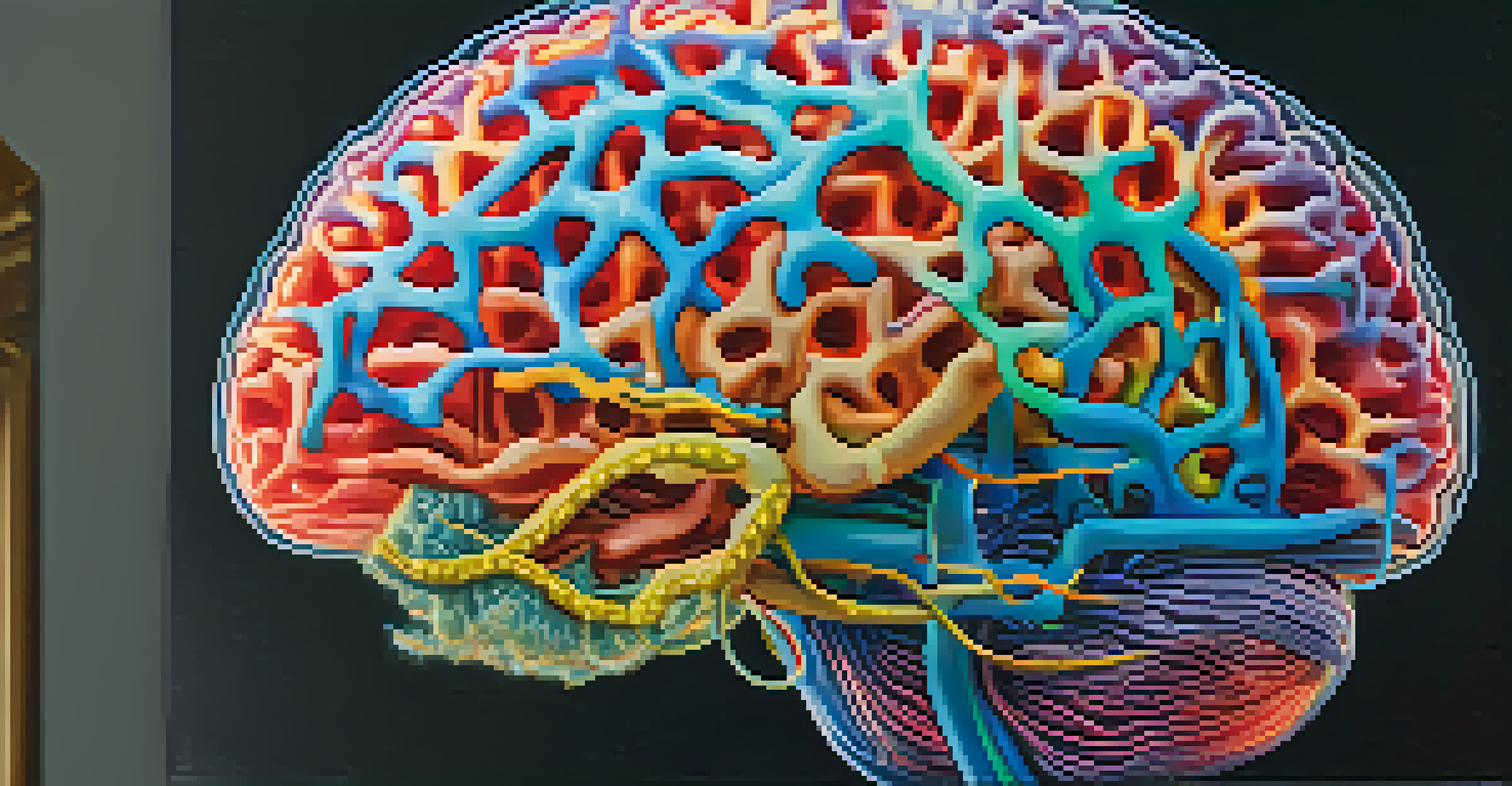Psychedelics and Memory: Implications for the Aging Brain

Understanding Psychedelics and Their Effects
Psychedelics are substances that alter perception, mood, and cognitive processes. Common examples include psilocybin, found in magic mushrooms, and LSD. These substances have gained attention not only for their recreational use but also for their potential therapeutic benefits.
The greatest discovery of my generation is that a human being can alter his life by altering his attitudes.
Research suggests psychedelics may help improve mental health conditions, such as depression and anxiety. By promoting neuroplasticity—the brain's ability to reorganize and form new connections—these substances could play a role in enhancing memory and cognitive function. This is especially intriguing when considering the aging brain.
The idea that psychedelics could positively impact memory is still being explored. However, as scientific interest grows, understanding how these compounds interact with our brain's aging processes becomes more critical.
Memory Decline in Aging: A Brief Overview
As we age, it's common to experience some decline in memory. Conditions such as Alzheimer's disease and other forms of dementia highlight the challenges older adults face in retaining information. This memory loss can lead to a decreased quality of life and increased dependency on others.

Research indicates that the hippocampus, a key area for memory formation, shrinks with age, which may contribute to memory impairments. Additionally, the accumulation of amyloid plaques and tau tangles in the brain are linked to age-related memory decline. Understanding these factors is crucial for exploring potential interventions.
Psychedelics May Boost Memory
Research suggests that psychedelics like psilocybin can enhance memory and cognitive function, particularly in aging populations.
Addressing memory decline through innovative approaches, including psychedelics, could provide a new avenue for improving cognitive health in older adults. By focusing on memory enhancement, we can help maintain independence and improve overall well-being.
Psychedelics and Neurogenesis: A Promising Link
Neurogenesis, the process of generating new neurons, plays a vital role in memory and learning. Studies have shown that psychedelics may promote neurogenesis, particularly in the hippocampus. This could potentially counteract age-related neuronal loss and improve cognitive function.
The mind is everything. What you think you become.
For instance, research with psilocybin has demonstrated increased neural growth in animal models, suggesting that these compounds can encourage brain health. As neurogenesis declines with age, enhancing this process could be a game changer for memory retention.
The prospect of using psychedelics to stimulate neurogenesis not only opens new doors for aging populations but also challenges our understanding of mental health treatment. By integrating these findings, we can explore their implications for memory enhancement in older adults.
Psychological Benefits of Psychedelics for Seniors
Beyond their neurological effects, psychedelics have been linked to psychological benefits that could enhance memory. Many users report profound experiences that lead to increased self-awareness and emotional clarity. For seniors, these benefits can be particularly impactful, helping them process past traumas or unresolved issues.
Psychedelics may also alleviate anxiety and depression, conditions that often accompany aging and can further impair cognitive function. By addressing these mental health challenges, older adults may find it easier to focus and retain information. This connection underscores the multifaceted role psychedelics could play in enhancing memory.
Neurogenesis and Aging Connection
Psychedelics may promote neurogenesis, potentially counteracting age-related neuronal loss and improving cognitive health.
Ultimately, the psychological effects of psychedelics may create a more conducive environment for memory retention, allowing seniors to engage more fully with their lives and experiences.
Existing Research on Psychedelics and Memory
While the research on psychedelics and memory is still in its infancy, some studies have shown promising results. For example, recent trials involving psilocybin have highlighted improvements in cognitive flexibility, which is crucial for problem-solving and memory recall. These findings are particularly relevant for older adults facing cognitive decline.
Additionally, studies have indicated that psychedelics can enhance mood and creativity, factors that can indirectly support memory. When individuals feel more connected and inspired, they're often better equipped to learn and retain new information. This synergy between emotional well-being and memory is a vital aspect of aging research.
As more studies emerge, the potential for psychedelics to serve as therapeutic tools for memory enhancement becomes increasingly viable. Continued research will be essential to fully understand their implications for the aging brain.
Potential Risks and Considerations
While the potential of psychedelics is exciting, it's essential to approach this topic with caution. Not everyone responds positively to these substances, and adverse effects can occur, particularly in older adults with pre-existing health conditions. Therefore, careful screening and medical oversight are crucial.
Additionally, the legal status of many psychedelics presents challenges for research and accessibility. In many places, these substances remain classified as illegal, hindering their use in clinical settings. Advocating for policy changes could pave the way for more extensive research and therapeutic applications.
Psychological Benefits for Seniors
The emotional clarity and self-awareness gained from psychedelics could help seniors process trauma and improve memory retention.
Lastly, understanding the appropriate dosages and settings for psychedelic use is key to minimizing risks. Ensuring that older adults have access to safe and supportive environments when exploring these substances can help maximize their benefits.
Future Directions for Research and Therapy
The future of psychedelics and memory research is bright, with numerous avenues yet to explore. Ongoing studies aim to determine the long-term effects of psychedelics on memory and cognitive function in aging populations. This research could lead to innovative treatment protocols tailored to seniors.
Furthermore, integrating psychedelics into existing therapeutic frameworks, such as cognitive behavioral therapy, could enhance their effectiveness. Combining these approaches might provide a holistic strategy for addressing memory decline in older adults, promoting both mental and emotional health.

As societal attitudes toward psychedelics continue to evolve, the potential for these substances to revolutionize memory care for the aging brain becomes increasingly plausible. With continued advocacy and research, we may be on the brink of a new era in cognitive health.